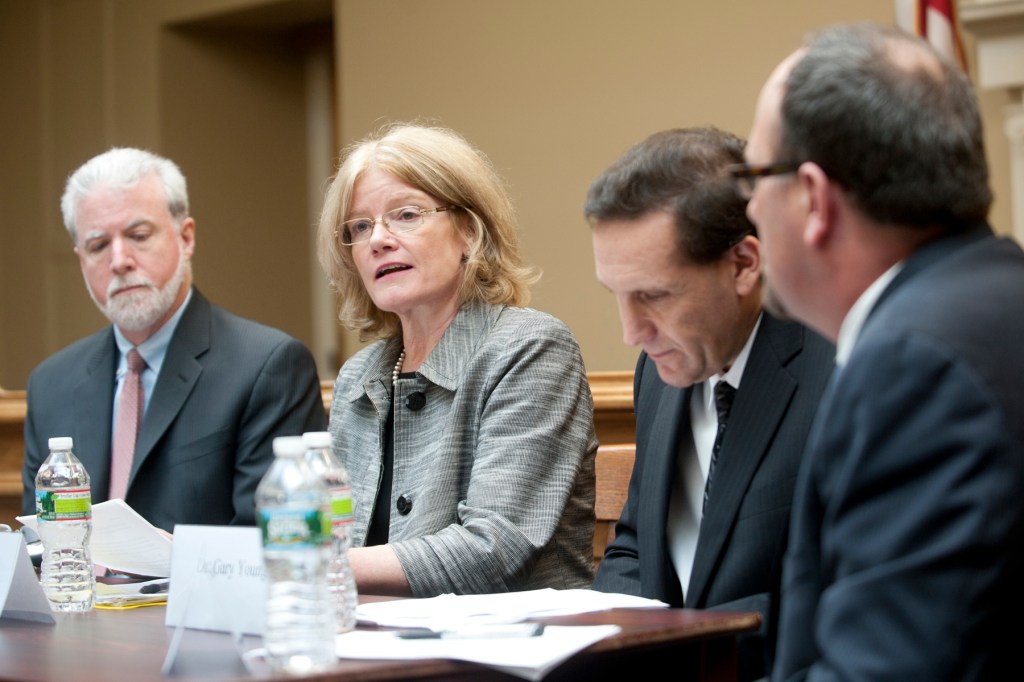Bouvé faculty brief legislators on health policy

In 2006, Massachusetts enacted a health-care mandate that inspired President Obama’s federal Patient Protection and Affordable Care Act. Now, the state legislature is poised to lead the nation once more by working on reforms that rein in the growth of health costs while maintaining quality.
Top Northeastern faculty briefed key lawmakers and aides on research and initiatives related to this push on Thursday at the Massachusetts State House.
“We want to work with all of you to make sure we are training the next generation of health-care workers and leaders,” Terry Fulmer, dean of the Bouvé College of Health Sciences, told lawmakers. “Northeastern is very interested in playing a real role as you move forward with this important legislation.”
Fulmer noted Northeastern’s leadership in training the next generation of nurses, pharmacists and physician assistants who “practice at the top of their license,” meaning many can work in critical-care roles now often fulfilled solely by physicians, whose work carries high premiums. New legislation, like the bills under consideration in Massachusetts, could empower these health professionals to take on more primary-care roles, working across disciplines to make care more efficient and accessible.
The approaching retirement of a large number of Baby Boomers makes now a perfect time to address rising health-care costs, noted Fulmer, a nationally renowned geriatrics expert.
“If there was a time to think ahead and anticipate the age wave and increasing disability population, it is right now,” Fulmer said.
Fulmer led the Northeastern panel that included Gary Young, director of the Center for Health Policy and Healthcare Research; Jack Reynolds, dean of the School of Pharmacy; Judy Barr, director of the National Education and Research Center for Outcomes Assessment in Healthcare; and Steve Alves, assistant dean of graduate programs in the College of Nursing.
Young’s research related to pay-for-performance — the idea that health-care providers receive more compensation for positive outcomes — has shown the method has little impact, but said it could be a better option if paired with a significant buildup of clinical infrastructure that makes electronic medical records and other data more accessible. Pay-for-performance is currently part of the draft Massachusetts bills, which embrace a global payment system that create several new revenue streams for the health-care industry.
Rep. Steve Walsh (D-Lynn), the House chairman of the Joint Committee of Health Care Financing, said both the House and Senate are committed to passing bills that control cost and prepare the next generation of health-care workers.
He thanked Northeastern for informing the legislative process. “We are thrilled about what happens at Northeastern,” Walsh said. “They get it. They get what needs to happen and why we need to be partnering like this.”
The faculty panel discussed a wide range of topics, including new methods of paying for medical treatment, the importance of building an infrastructure that allows health care providers to share records and collaborate and ways to empower more health care professionals, such as high-skill nurses and pharmacists.
Barr also recommended that the proposed program to forgive the loans of physicians and nurses who practice in rural and underserved settings be expanded to include pharmacists who want to work in community health centers, where Northeastern pharmacy students worked more than 30,000 hours in the last year.
The end of the hour-long briefing concluded with questions from legislators and staff members. Fulmer noted that dialogues between academia and policy-makers were important because each side has the ability to inform and guide the other.
“At Northeastern we want you to expect a lot from us and ask us the hard questions,” she said. “We believe our team’s interdisciplinary approach to health sciences can help guide you in this important process.”





